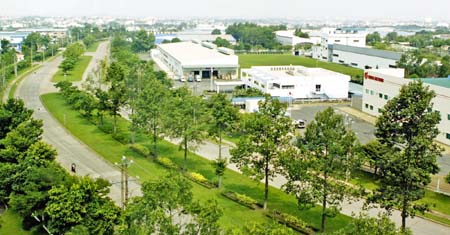At a recent seminar on promoting tech parks and resource recovery in HCMC, experts discussed the feasibility of developing eco-IPs (EIPs) and ways to find funding for environmental projects in Vietnam. The seminar was organized by the Small and Medium Enterprise Development Support Center 2 (SMEDEC 2) and the Taiwan Green Productivity Foundation (TGPF).
Yi-Fan Liao of TGPF presented models of building new EIPs and converting conventional IPs into EIPs.
With the second EIP model, waste of one enterprises will be processed into input materials of the other enterprise. This means materials will be maximized to turn out products and reduce throwaways.
Liao took the success of Linhai IP in southern Taiwan as an example. By applying the EIP model, Linhai IP has cut carbon dioxide emissions, increased the recycling rate from 84.4% to 87.6%, reused 428,000 tons of materials and waste a year and generated economic efficiency of US$27.8 million annually.
However, such a model cannot be implemented in Vietnam now, according to Prof. Tran Minh Chi, former head of the Institute of Tropical Technology and Environmental Protection.
Chi said IP authorities in Vietnam could not interfere enterprises’ decisions to recycle waste. Besides, it is costly to develop facilities to enable enterprises to apply the model.
In addition, in Vietnam some types of hazardous waste must be treated at designated places.
Sharing the same opinion, Nguyen Hoang, deputy editor-in-chief of Cong Thuong newspaper, said such a model is a great idea but it takes time for enterprises to understand and apply it.
Speaking at the seminar, Prof. Chien-Te Fan from National Tsing Hua University stressed the importance of promoting international cooperation in working towards green growth.
According to Fan, the Asian Development Bank (ADB) has funded more programs aimed to mitigate the impact of climate change. The bank often offers low-interest loans for prioritized projects.
The European Bank for Reconstruction and Development also provides substantial assistance for enterprises and programs in the sector.
As for Vietnam, Fan proposed developing a tech park for enterprises operating in renewable energy and high technology sectors. He said Vietnamese and Taiwanese firms can work together to draw up viable projects and find international funds to implement them.
Nguyen Nam Hai, deputy head of the Directorate for Standards, Metrology and Quality, said a good project must be developed based on high technology and joint efforts of the State, associations, enterprises and IP authorities.
He noted that raising awareness of green industrial development is necessary but this cannot happen overnight.
Source: VietnamNet Bridge | 08 November 2015














